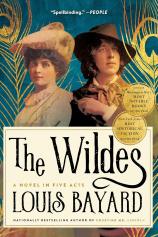The Wildes: A Novel in Five Acts
Review
The Wildes: A Novel in Five Acts
THE WILDES opens with a beautiful love letter sent from Oscar Wilde to his wife, Constance. Most readers will be puzzled by this and ask, “I thought Oscar Wilde was a homosexual?” and “Wasn’t he imprisoned for indecency?” While the answers to these questions may be well-known bits of historical fact, it is just the starting point for a novel that delves so much deeper into what this man and his relationship with Constance was all about.
Louis Bayard’s book only could have been released and fully appreciated in the present day, as most recognize that people can't allow themselves to let a label categorize and define who they truly are. The novel is told in five acts, like a play Wilde may have written. The opening act features a setting and a cast of characters you might have seen in one of his plays, like The Importance of Being Earnest or A Woman of No Importance. In addition to Oscar and Constance, we have Lady Wilde, Oscar’s mother; Cyril, their oldest son; Arthur and Florence Clifton, the hired help; and, of course, the unexpected guest who arrives and impacts everyone in the story.
"THE WILDES is eye-opening and heartbreaking and provides so much detail and surprise testimony in the form of historical fiction that it will make you reconsider what you thought you knew about Oscar Wilde."
The setting is 1892 at a summer getaway in the Norfolk countryside. Oscar and Constance’s youngest son, Vyvyan, had to stay behind due to a bout of whooping cough. The language is as witty as you would expect from a Wilde play or novel, which makes it ironic when he states, “Books and plays are not truth, my love. They are exercises in sensation.” It is all happy and innocent banter until Oscar says that an individual to whom he had extended an invitation had accepted and would be spending a couple of days with them. He is none other than Lord Alfred Douglas. Upon his arrival, the demeanor of the group changes as it is obvious to all that the young poet is infatuated with Oscar and they seem to be more than just friends.
Constance bears up, as she knows the visit is a short one, until Oscar announces that Lord Alfred will be staying on longer to translate his French work, Salome, into English. No one really buys this excuse, and Arthur even suggests that Constance would be more qualified to handle such an endeavor. In a very telling conversation that leads to the subject of art and morality, Oscar professes that a book is neither moral nor immoral --- it is only well written or badly written. When Cyril points out to his mother the extra hidden attic room, Constance immediately recognizes it as her husband’s rendezvous spot with their guest.
This leads to perhaps the best moment of the novel when Oscar and Constance get everything out in the open in a stunning and awkward conversation. It results in Constance, Cyril and Lady Wilde leaving Norfolk, while Oscar and Lord Alfred stay behind. Their immoral relationship is called into question publicly by Lord Alfred’s father, the Marquess of Queensberry, and Oscar sues him for slander. The infamous court case does not go well for Oscar as judge and jury find him guilty of indecency and sentence him to two years in prison.
The remaining acts give us a much deeper understanding of the rest of the Wilde family in Oscar’s absence. We see Constance and her two sons spending a brief exile in Italy and learning of Oscar’s eventual release from prison. We then leap forward in time for scenes featuring Cyril as a sniper in World War I and another with Vyvyan as a young man who gets to confront both Arthur and Lord Alfred about what occurred when they were young. Every act in this wondrous novel carries its own bit of sorrow and pain and makes the total work play out like a Shakespearean tragedy.
The final act once again brings us back to 1892 in moments not seen before that feature Constance confronting both Oscar and Lord Alfred about their relationship and discussing what their marriage will look like going forward.
THE WILDES is eye-opening and heartbreaking and provides so much detail and surprise testimony in the form of historical fiction that it will make you reconsider what you thought you knew about Oscar Wilde. I cannot think of many authors outside of Louis Bayard who could capture so effectively his voice, quips and witticisms. Well beyond that, the book allows readers to enter into the mind and soul of a legend. It is an act of tribute and just plain love for Wilde and all the many contributions he has made to both literature and the world in general.
Reviewed by Ray Palen on September 20, 2024
The Wildes: A Novel in Five Acts
- Publication Date: August 12, 2025
- Genres: Fiction, Historical Fiction
- Paperback: 320 pages
- Publisher: Algonquin Books
- ISBN-10: 1643755528
- ISBN-13: 9781643755526




